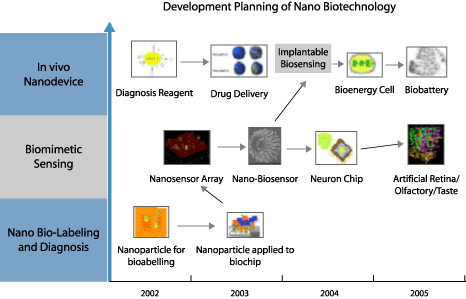Technology Summary
Virus is believed to be the most delicate nanocomponent in the nature, and it is a popular subject of research due to its variety and availability. Based on the present knowledge in nanostructure and its manufacturability, using self-assembly to construct industrially applicable nanocomponents rely on the nature of the composing parts in the component. Desired features for these nanocomposing parts include:nano-composing parts include (1) they can be cloned; (2) they can be reorganized; (3) they are active and recognizable, with functions; and (4) they can sense the environmental changes. Through molecular biological and chemical means the above mentioned features of biological macromolecules can be easily verified and expressed in the cases of biological macromolecules such as nucleic acid, protein and polar lipids.
Current Status
One of the targeted research direction in nanobiotechnology is to investigate nanotechnologies regarding biomolecules including (1)the application of self-assembly model in nucleic acid to the control of multidimensional structure, topology, molecular optoelectronic components, electron transfer, electron tunneling, and nanoscale sensing array chip; (2)the application of self-assembly model of protein molecule in biological system to computer and optical recognition memory analysis; (3)the application of self-assembly model of lipid molecule in biological system to artificial cell membrane and micro lipid particle for drug delivery. Moreover, it can be applied to biomimmetic sensory components , including artificial retina, artificial olfactory, artificial taste bud, and artificial nerve transmission.
Another targeted area of nanobiotechnology is based on nano materials and technology in conjunction with molecular biology techniques through the use of various molecular modified nanomaterials or components including dendrimer, nanotube, nanoparticles, or quantum dot to apply in medical examination and treatment, drug delivery, transplant, biomimetic sensing, genetic therapy, immunological diagnosis and MRI developer.

Accomplishments / Industry Impact
The huge amount of information and interdisciplinary technologies developed from gene researches have wide applications and pave new ways for industrial and medical sectors such as pharmaceuticals, agricultural products, food, chemical/materials, and electronics.
ITRI establishes infrastructures for gene technology according to the biotechnology development guidelines of Taiwan, and actively develops the application of gene technology in pharmaceuticals to promote the biomedical standing of Taiwan.
